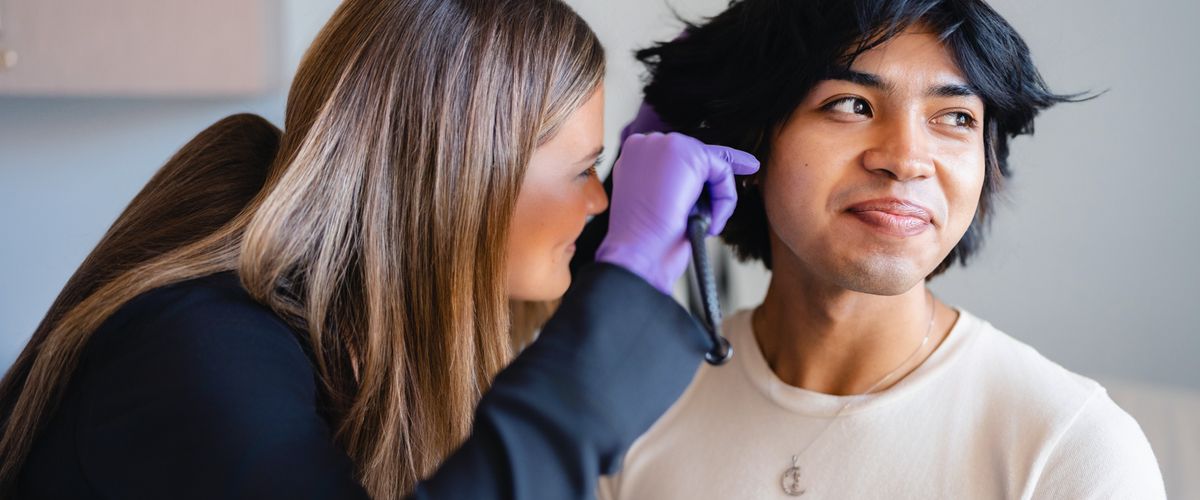Urgent Health Concerns
If you are sick, injured, or have another health-related concern, you can come to SHS or visit an urgent care location near campus.
Common urgent concerns include:
- Fever
- Cold or cough
- Urinary or genital symptoms
- Abdominal pain or digestive issues
- Injury
- Skin rash
- Dizziness or headache
If you are experiencing a life-threatening emergency, get help now.
Make an appointment
Off-Campus Urgent Care Locations
If you’re sick or injured and SHS is closed, there are several urgent care locations convenient to BU’s campuses.
Common concerns and when to get help
Cold & Flu symptoms
Symptoms may include fever (100.4 degrees or above), headache, achy muscles, cold sweat, cough, fatigue, nasal congestion, runny nose, and sore throat.
When to contact SHS
Seek care if you are experiencing a fever that lasts more than 3 days, have difficulty breathing, chest or abdominal pain, severe headache, difficulty swallowing, dizziness, persistent vomiting, or your symptoms last more than 10 days or are getting worse.
Call SHS or send a message through Patient Connect to ask for advice. Most cold symptoms are caused by a virus and do not need to be evaluated by a healthcare provider. Our nurses can offer care and treatment advice via Patient Connect or over the phone.
If SHS is unavailable, call our after-hours line, 617-353-3575, to get advice from a nurse. Depending on your symptoms, they may recommend you go to a nearby urgent care.
Bronchitis or chest cold
Coughing caused by swollen airways in the lungs and increased mucus production is called bronchitis or a chest cold.
When to contact SHS
Contact SHS if your fever goes above 100.4 degrees, you’re having trouble breathing, chest pain, your mucus is thick or bloody, you vomit frequently after coughing or your symptoms last more than 2 weeks. Acute bronchitis will usually go away on its own—antibiotics are generally not needed.
If SHS is unavailable, call our after hours line, 617-353-3575, to get advice from a nurse. Depending on your symptoms, they may recommend you go to a nearby urgent care.
Urinary Tract Infection (UTI)
UTIs are caused by bacteria that have entered the opening of the bladder.
When to contact SHS
If you’re experiencing painful and frequent urination, a low fever, cloudy or bloody urine, and/or lower abdominal cramping, send a message to SHS through Patient Connect. A provider can determine if the infection is a bladder infection, a kidney infection, or a symptom of something else, like an STI. Most UTIs are successfully treated with antibiotics.
If you’re experiencing UTI symptoms, please follow the steps below:
- Log on to Patient Connect
- Select Appointments
- Select Schedule an Appointment
- Select Primary Care/Medical
- Select Urinary Symptoms
- Choose Male, Female, or Intersex
- Specify your appointment reason
Sexually Transmitted Infections (STIs)
Symptoms vary and may include abdominal or pelvic pain, lesions, rash, fever, unusual vaginal discharge or bleeding, urinary symptoms, penile discharge or testicular pain or swelling.
When to contact SHS
If you have any of the above symptoms or suspect you have been exposed to an STI, please call or schedule an appointment via Patient Connect.
Vaginal Pain
Vaginal pain, along with symptoms like irregular discharge, itching, and pain during sex or urination is a common experience that can have many different causes.
When to contact SHS
If you’re experiencing vaginal pain, schedule an appointment with SHS to discuss your symptoms and identify a potential treatment. Whether you’re experiencing a yeast infection, bacterial infection, or STI symptoms, SHS can help.
Abdominal pain and digestive issues
Common symptoms include abdominal pain, nausea, vomiting, constipation, hemorrhoids, diarrhea, gas, bloating, and heartburn.
When to contact SHS
Call SHS or send a message via Patient Connect if you need medical advice to treat your symptoms or develop new pain, persistent vomiting or diarrhea, rash, or fever.
Get emergency medical help if you are in severe pain, sudden onset of stomach pain, high fever, or have blood in your stool or vomit. If SHS is unavailable, call our after hours line, 617-353-3575, to get advice from a nurse. Depending on your symptoms, they may recommend you go to a nearby urgent care.
Back pain
Back pain is a common complaint that usually goes away on its own, but more severe pain with associated neurological symptoms requires evaluation.
When to contact SHS
Call SHS or send a message through Patient Connect if you would like medical advice on how to treat your back pain, develop worsening pain, the pain is accompanied by numbness or tingling that spreads down one or both legs, or you have associated urinary symptoms or a fever.
Get emergency medical help if you develop severe, unrelenting pain, lower leg weakness, or loss of bladder/bowel control, high fever, or are associated with a traumatic injury like a fall or car accident. If SHS is unavailable, call our after hours line, 617-353-3575, to get advice from a nurse. Depending on your symptoms, they may recommend you go to a nearby urgent care.
Headaches
A headache can be any type of pain in your head—one side or both, throbbing or vise-like, sharp or dull. A headache can happen suddenly or gradually, and last for a few minutes or a few days.
When to contact SHS
If your headaches are occurring more frequently or severely than usual, don’t improve with the help of over-the-counter medicines, or are getting in the way of your participation in daily activities, schedule an appointment at SHS to meet with a provider.
Seek emergency medical help if you are experiencing confusion, fainting, high fever, vomiting, or having trouble walking, speaking, or understanding speech. If SHS is unavailable, call our after hours line, 617-353-3575, to get advice from a nurse. Depending on your symptoms, they may recommend you go to a nearby urgent care.
